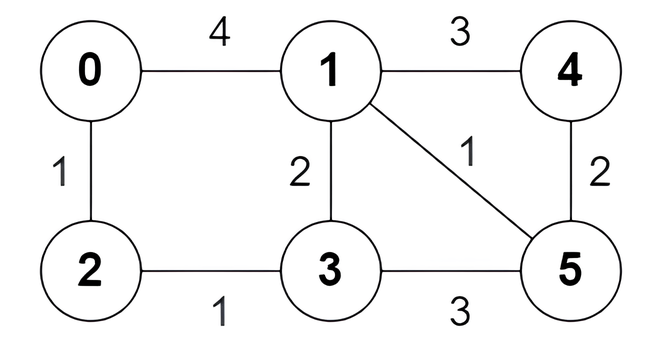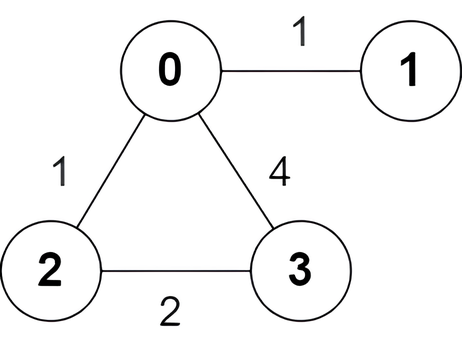LeetCode in Kotlin
3123. Find Edges in Shortest Paths
Hard
You are given an undirected weighted graph of n nodes numbered from 0 to n - 1. The graph consists of m edges represented by a 2D array edges, where edges[i] = [ai, bi, wi] indicates that there is an edge between nodes ai and bi with weight wi.
Consider all the shortest paths from node 0 to node n - 1 in the graph. You need to find a boolean array answer where answer[i] is true if the edge edges[i] is part of at least one shortest path. Otherwise, answer[i] is false.
Return the array answer.
Note that the graph may not be connected.
Example 1:

Input: n = 6, edges = [[0,1,4],[0,2,1],[1,3,2],[1,4,3],[1,5,1],[2,3,1],[3,5,3],[4,5,2]]
Output: [true,true,true,false,true,true,true,false]
Explanation:
The following are all the shortest paths between nodes 0 and 5:
- The path
0 -> 1 -> 5: The sum of weights is4 + 1 = 5. - The path
0 -> 2 -> 3 -> 5: The sum of weights is1 + 1 + 3 = 5. - The path
0 -> 2 -> 3 -> 1 -> 5: The sum of weights is1 + 1 + 2 + 1 = 5.
Example 2:

Input: n = 4, edges = [[2,0,1],[0,1,1],[0,3,4],[3,2,2]]
Output: [true,false,false,true]
Explanation:
There is one shortest path between nodes 0 and 3, which is the path 0 -> 2 -> 3 with the sum of weights 1 + 2 = 3.
Constraints:
2 <= n <= 5 * 104m == edges.length1 <= m <= min(5 * 104, n * (n - 1) / 2)0 <= ai, bi < nai != bi1 <= wi <= 105- There are no repeated edges.
Solution
import java.util.PriorityQueue
class Solution {
private lateinit var edge: IntArray
private lateinit var weight: IntArray
private lateinit var next: IntArray
private lateinit var head: IntArray
private var index = 0
private fun add(u: Int, v: Int, w: Int) {
edge[index] = v
weight[index] = w
next[index] = head[u]
head[u] = index++
}
fun findAnswer(n: Int, edges: Array<IntArray>): BooleanArray {
val m = edges.size
edge = IntArray(m shl 1)
weight = IntArray(m shl 1)
next = IntArray(m shl 1)
head = IntArray(n)
for (i in 0 until n) {
head[i] = -1
}
index = 0
for (localEdge in edges) {
val u = localEdge[0]
val v = localEdge[1]
val w = localEdge[2]
add(u, v, w)
add(v, u, w)
}
val pq = PriorityQueue { a: LongArray, b: LongArray -> if (a[1] < b[1]) -1 else 1 }
val distances = LongArray(n)
distances.fill(1e12.toLong())
pq.offer(longArrayOf(0, 0))
distances[0] = 0
while (pq.isNotEmpty()) {
val cur = pq.poll()
val u = cur[0].toInt()
val distance = cur[1]
if (distance > distances[u]) {
continue
}
if (u == n - 1) {
break
}
var localIndex = head[u]
while (localIndex != -1) {
val v = edge[localIndex]
val w = weight[localIndex]
val newDistance = distance + w
if (newDistance < distances[v]) {
distances[v] = newDistance
pq.offer(longArrayOf(v.toLong(), newDistance))
}
localIndex = next[localIndex]
}
}
val ans = BooleanArray(m)
if (distances[n - 1] >= 1e12.toLong()) {
return ans
}
dfs(distances, n - 1, -1, ans)
return ans
}
private fun dfs(distances: LongArray, u: Int, pre: Int, ans: BooleanArray) {
var localIndex = head[u]
while (localIndex != -1) {
val v = edge[localIndex]
val w = weight[localIndex]
val i = localIndex shr 1
if (distances[v] + w != distances[u]) {
localIndex = next[localIndex]
continue
}
ans[i] = true
if (v == pre) {
localIndex = next[localIndex]
continue
}
dfs(distances, v, u, ans)
localIndex = next[localIndex]
}
}
}

